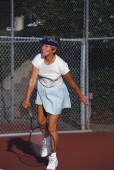
MONDAY, May 20 (HealthDay News) — Although people with implantable cardioverter defibrillators (ICDs) are often advised to avoid activities more strenuous than golf or bowling, new research suggests that many people with these heart devices can participate in more vigorous sports.
But, the decision to participate in sports should be made on an individual basis following a discussion between patients who have the defibrillators and their doctor, the researchers from Yale University School of Medicine concluded.
The defibrillators are placed inside the chest to deliver electrical shocks if a dangerous heart rhythm is detected, to restore a normal heartbeat.
The study, published May 20 in the journal Circulation, involved 372 people with implantable defibrillators ranging from 10 to 60 years old. Participants included competitive high school and college athletes as well as others who engaged in vigorous sports, such as running, basketball, tennis and snowboarding. The researchers followed the participants for an average of two and a half years.
Over the course of the study, 77 people received 121 shocks. Ten percent received shocks during a competition or practice, 8 percent were shocked during other activities and 6 percent were shocked while resting.
Although some athletes received shocks for serious and non-life-threatening heart rhythms during sports, none of the participants was hurt or died from the shocks or underlying abnormal rhythms, the study found.
The rate of shocks among the athletes was similar to the shocks reported in previous studies of less-active people with implantable defibrillators, the study’s authors said.
Older guidelines on the activities of patients with defibrillators were based on doctors’ judgment and not data compiled on strenuous sports, study author Dr. Rachel Lampert, an associate professor of medicine at Yale, said in a journal news release.
More information
The U.S. National Heart, Lung, and Blood Institute provides more information on implantable cardioverter defibrillators.

